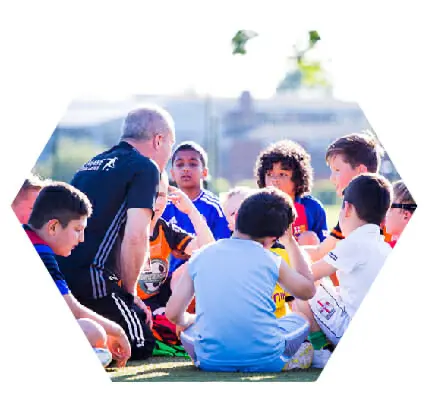Football camps aren’t all just running around, kicking balls and scoring goals. While wanting to be the next Lionel Messi, Ronaldo or Neymar may be the overriding reason for many children to attend a football camp, their social skills can improve nearly as much as their playing ability.
From working with others, and listening to coaches to learning the importance of following rules, here are four ways in which football camp can help to improve social skills.
Working with others and being part of a team
Teamwork makes the dream work. That’s especially true when it comes to football. Although we all love the individual brilliance of Messi or Cristiano Ronaldo, their successes have been hugely aided by their respective teams at Barcelona and Real Madrid.
At a football camp, children will learn about the importance of teamwork through match situations in small-sided games and tournaments. They’ll understand how working with others can help achieve a common goal and learn how to become a team player – all of which are important skills which will serve them well in later life.
Communication in a group
Where does successful teamwork come from? Mostly, it’s the ability to communicate effectively. When it comes to football, the best defenders of all time are the ones who talk the most to their teammates. Watch John Terry, Vincent Kompany or Rio Ferdinand and you’ll see a player who is constantly communicating, encouraging teammates, issuing instructions and organising those around them.
It isn’t just giving out directions that is important when it comes to football either. Being able to listen and understand what you are being told is equally vital to the chances of a team’s success. That could be from a teammate calling for the ball or a coach handing out tactical advice or instructions to practice.
Without good communication skills, football simply wouldn’t work as a team or group sport. By playing the beautiful game, children are practising communicating without even realising it.
Following rules and learning how to act in a social environment
Life is full of rules and one of the most important lessons we can learn from a young age is that we must follow them. Breaking the rules can lead to damaging consequences and there is no better place of learning than on the sports field.
If you break the laws of football, there can be consequences. Give away a foul and the other team get a free kick. Handle the ball and you could concede a penalty. Nobody wants to be the player who costs their team a goal because they broke the rules, which means that football is an excellent way to instil the importance of respecting order.
This doesn’t just start and end with written rules. There are various unwritten laws and customs that players will learn to follow, most of which surround fair play. Take for example kicking the ball out when a player is injured and returning of possession to the opposition if they’ve done so. There is nothing in the laws of football that says you have to do either of those things, it’s just accepted as being the right thing to do. Playing football can help your child develop as a person.
Football camp can teach children not only why they need to follow rules, but also how doing so can make them fairer, better and more respected individuals.
Confidence
A football camp can be an excellent way to help foster confidence in a child on several different levels. Individually, football brings children out of their shells as they learn new skills. As they focus on learning new skills and the ball, they will forget about being shy or the challenge of being in a group.
Learning new skills can also lead to improved self-belief. Being able to master a Cruyff Turn or shooting with their weaker foot can give kids confidence that with hard work and perseverance, they can achieve what they want to. They will be racing home to impress you with their new skills!
They can also develop confidence through the collective aspect. Being praised by coaches and teammates for their work and being part of a successful side will breed confidence. This in turn will filter through to other areas of their lives, making them appreciate their own personal talents and helping to develop other social skills.
We hope that you have enjoyed this article and that your child will take part in football or another sport during the break. Sports are a fantastic way to help children improve their social skills. If you are looking to get your child involved in football during the holidays, try a We Make Footballers holiday camp. With expert coaches, great facilities and a syllabus focused on fun - we provide a fantastic environment for players to develop their social skills.



